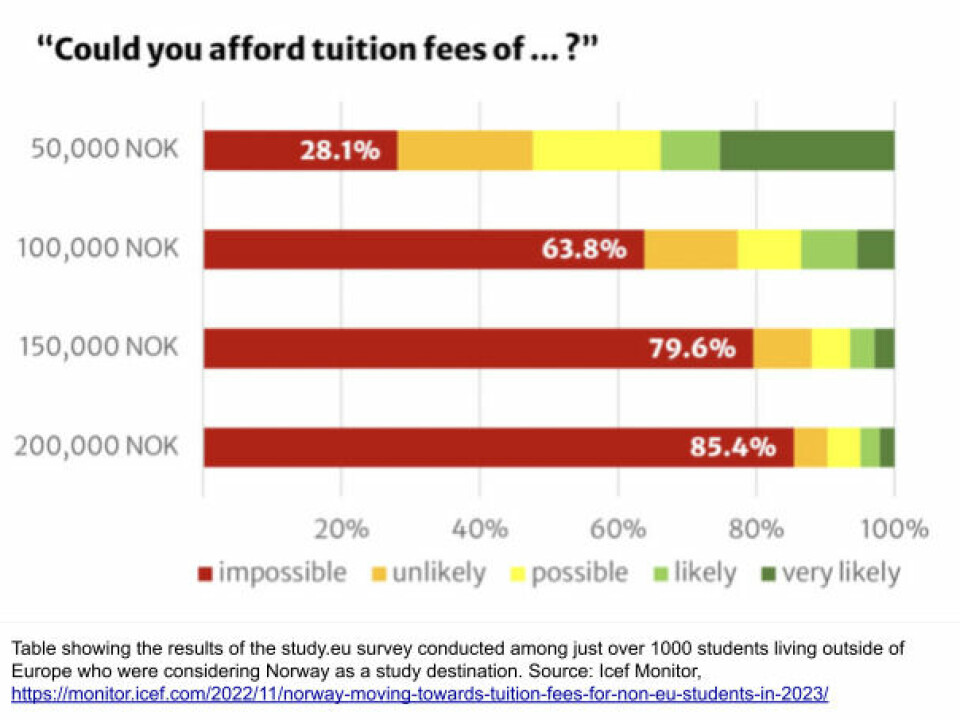
Why Tuition Fees for Non-EU Students May Be a Good Idea
Pro et contra
Introducing tuition fees for students outside the EEA and Switzerland came as a surprise for many in Norway, as there has been an intense debate about the discriminatory character of the legislation from its introduction and up until today. To answer the big question of why the law was passed anyway, I offer you an overview of the official arguments for legislation and some of the biggest questions with or without the Norwegian government’s answers.
The Norwegian economy required a change of priorities
According to Ola Borten Moe, Minister of Research and Higher Education of Norway, the main trigger of the legislation is economics. As Moe wrote on altinget.no, “The economic situation in Norway made it necessary to make clear priorities in the budget, and the introduction of the student fees for students from countries outside the EEA and Switzerland is one of these priorities” (here and in the rest of the article – all translation from Norwegian is mine, S.Ch.).
Let us take a closer look at some of the economic challenges Norway faces today that trigger the changes in the country’s fiscal policy. As the major industries of Norway are gas and oil, the biggest global challenges in energy markets and environmental considerations had a significant influence on Norwegian economics, states Nordea. “The price of natural gas in Europe has fallen sharply since the peak in September last year. This is curbing the imported price growth here in Norway. The markets are also predicting lower prices for oil and electricity going forward,” quotes Statistics Norway a research economist Thomas von Brasch.
In such circumstances, Norway chose to shift the economy from power production driven by fossil fuels and nuclear energy to the sustainable, renewable, and climate-friendly options as soon as possible (the ambitious goal is to reduce emissions to 55% by 2030) by drawing bigger financial resources to technological development and encouraging new initiatives, innovations and research, writes Inhunt World. When considering this, one could even guess what a part of the money freed by the new educational law will be used for: sustainability and technological development.
The world is in crisis, and so is Norway
On top of that, according to the State Budget 2023, the worldwide crises of the 2022 have affected Norway, too:
We are in a demanding time with war in Ukraine, energy crisis in Europe and sharp price increases. At the same time as there is high activity in the Norwegian economy, it is becoming more expensive for people to live.
Besides these long-term problems, the country has to deal with very evident, here-and-now issues that occur as a result of the critical processes going on in the world. Major fiscal challenges Norway faces today have a clear impact on everyday life of every single resident of Norway: “Consumer prices rose 5.8% in 2022 compared to 2021 – mainly driven by sharply higher energy and food prices, but also broad-based increases in prices of other products and services,” estimates Nordea. SSB continues, “Inflation, measured by the Consumer Price Index (CPI), has risen to levels not seen since the 1980s. This is a result of the exceptionally high price growth abroad, which has spilled over into Norwegian prices.”
According to Ola Borten Moe, Minister of Research and Higher Education in Norway, central global issues and, therefore, new fiscal challenges for Norway, required restructuring of the financing system of Norwegian educational institutions:
The world is in a bigger crisis than in a long time and this puts extreme pressure on the national budget. Norway is no exception. We will continue to spend a lot of money on higher education and research. The level must be high, but the universities and colleges must also look at other ways of getting income.
— Ola Borten Moe on Regjeringen.no, Minister of Research and Higher Education of Norway.
According to "Status report for higher education 2023" ("Tilstandsrapport for høyere utdanning 2023"), during the last decade, the share of international students in Norwegian higher education institutions increased by 18%. Nearly 45% of them come from Europe, and about 38% – from Asia. During the decade, the number of international students from Asia and North-, South-, and Central America has doubled, while the number of students from Europe has decreased by 8%. Over the last year, the number of students from Africa increased by 11%.
Each study place costs a lot for the Norwegian state, and it is rare for a state to offer free higher education to international students. The Storting agreed with this priority [to introduce tuition fees for students outside EU/EEA and Switzerland].
— Ola Borten Moe on altinget.no, Minister of Research and Higher Education of Norway.
All good, but where will the money go?
On 6 October 2022, the government presented its proposal for the state budget and national budget for 2023. The list of priorities for 2023 budges, according to the State Budget 2023, looks like this:
Fair redistribution and security provision for people's everyday finances;
Safety of the joint welfare services;
Cutting emissions and facilitating green jobs;
Prioritising everyone's safety and showing solidarity in a troubled time.
Freeing the state from financing incoming full-degree students from around the world and adding tuition fees as another source of income for educational institutions, would increase state budget capacity for investing a lot more in the listed priorities: security, welfare, green policy, and solidarity.
For example, a big part of the state budget will contribute to developing the education system in Norway. The grant to universities and colleges will be reduced by NOK 74.4 million as a result of an expected increase in the income from tuition fees. Instead, more finances will be directed toward increasing allocations for educational and research institutions: funds for new study places (in nuclear subjects and medicine, for example), better student housing, investing in a new science building or a new Viking Age museum, etc.
Prioritising Norwegian students also means exempting Europeans from tuition fees
Erudera News wrote that the Norwegian government approved the new law in order to prioritise Norwegian students first and foremost and emphasised that the government cannot introduce the fees to EU/EEA and Swiss students due to their political agreements as long as Norwegian students are free from payments.
Via introducing tuition fees for international students outside the EU/EEA and Switzerland, the Ministry of Education is aware of the expected large decrease in the number of new international students from countries outside Europe, and the probability that in future, students from European countries will make up a larger proportion of the international students in Norway. The decreasing number of students from outside Europe, which by November 2022 was equaling two-thirds of all international students in Norway, according to Icef Monitor, would come in handy in terms of housing and education of Norwegian students:
Since we will have fewer international students, this will release both study places and housing for Norwegian students.
— Icef Monitor quoted Moe on November 16, 2022.
As it is clearly stated in the State Budget 2023, the expected decrease in the number of foreign students – at least during 2023-24 – will, according to the estimates, free up capacity for students from Norway and EØS.
All these examples, at some point, imply prioritising EU/EØS students similarly to Norwegians, which may be linked to the topic of Norway-EU relations. Although Norwegians have twice abolished the country’s quest for joining the EU during referendums in 1972 and 1994, and The University of Bergen survey from 2019 showed the similar attitude among the people according to the Nordic Labour Journal, the Norwegian government is quite straightforward about the role and interest of Norway in relation to the EU. Norway needs a powerful voice to influence important decisions outside its borders, therefore, the country “must be more clear and assertive, and more active in the early stages of debate on issues of European policy. It is in Norway’s national interest to cooperate closely with the EU and to participate actively in the ongoing political processes in Europe.”
To some questions, the government answers
Bjørn Stensaker, Vice Chancellor for Education at the University of Oslo, talks about the importance of international students, emphasising that they do not have much economic value except the ability to bring diversity and new perspectives in the Norwegian student auditorium: “It is linked to the quality and a need to keep in touch with the outside world,” he said to Klassekampen.
Mariann Enge, an MA student at The Academy of Fine Arts in Oslo (Kunstakademiet i Oslo), wrote a comment on the legislation after participating in the panel discussion “Free Education For All.” She was concerned with how international students are perceived in politics: as if they “have nothing to contribute with, they are just taking up space. They are seen as an expense, not as an investment or resource.”
As an answer to these concerns of underestimating the value of international students, the government highlights that they appreciate the contribution of international students to the Norwegian quality education: “We want more international students to come to Norway on exchange agreements, and therefore we protect these students. The main priority for student mobility must be exchange students,“ said Ola Borten Moe on Regjeringen.no.
Additionally, although the number of international students from outside Europe will dramatically decrease in the beginning, it is expected to go back to its normal rate in a couple of years, taking into account the experience of other Nordic countries like Sweden and Finland. After introducing tuition fees for international students in 2011, Sweden had a decline in foreign enrolments of up to 80% until 2014, when it went back to about what it was in 2011. The Stockholm Academic Forum (STAF) report emphasises the role of strategic approach to the issue, “The increase has been attributed to more focused marketing on the part of Swedish institutions, and growing number of joint programmes with institutions abroad.”
Clearly, the Norwegian government also chose to focus on promoting the quality of education and encouraging more exchange program participation for international students instead of full-degree studies. The Ministry of Education states that the priority is to get highly motivated international students that will choose Norway for the quality of education:
Our universities and colleges should be well equipped to recruit international students because the quality of the education is good, and not because it is free. I also think that a tuition fee will give us more motivated international students.
According to the study.eu 2022 survey statistics, 75.6% of international students outside Europe choose Norway as a study destination due to the quality of education or the University’s reputation, while around the same amount – 74% – used to choose Norway for the tuition-free study option.
But some of the biggest questions remain open
Rich students will have access to Norwegian higher education, while financially less capable youth ends up losing a promising opportunity. According to the survey conducted by the study.eu, about 80% of 1000 non-European students who were considering studying in Norway in future, believed it would be impossible for them to pay for a study program that costs around 150 000 NOK. As Catherine Jane Smith explored for Universitas, it is about an average of what the fee will be for most of the programs and universities.Moreover, although the government claims that the international students will choose Norway for the quality of education, it is yet unclear whether Norwegian universities can actually compete with other paid education programmes like the ones in the US, for example. The only way to find out, it seems, is to wait and see for ourselves.
































